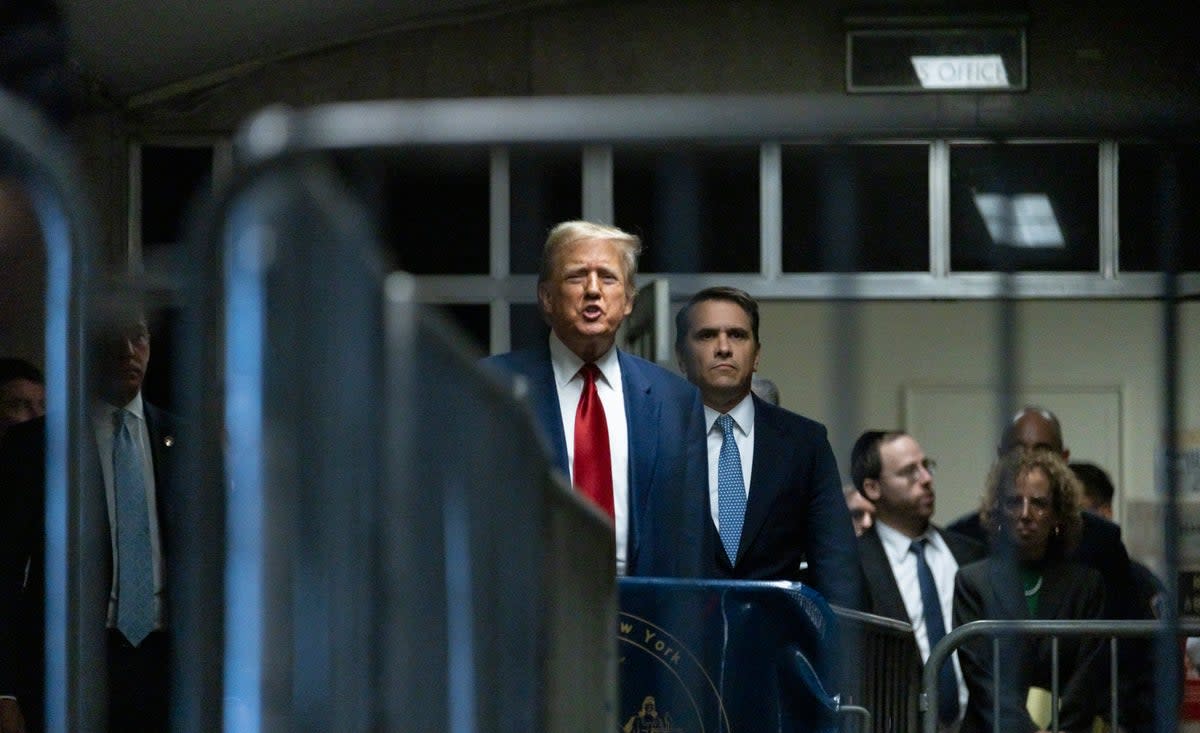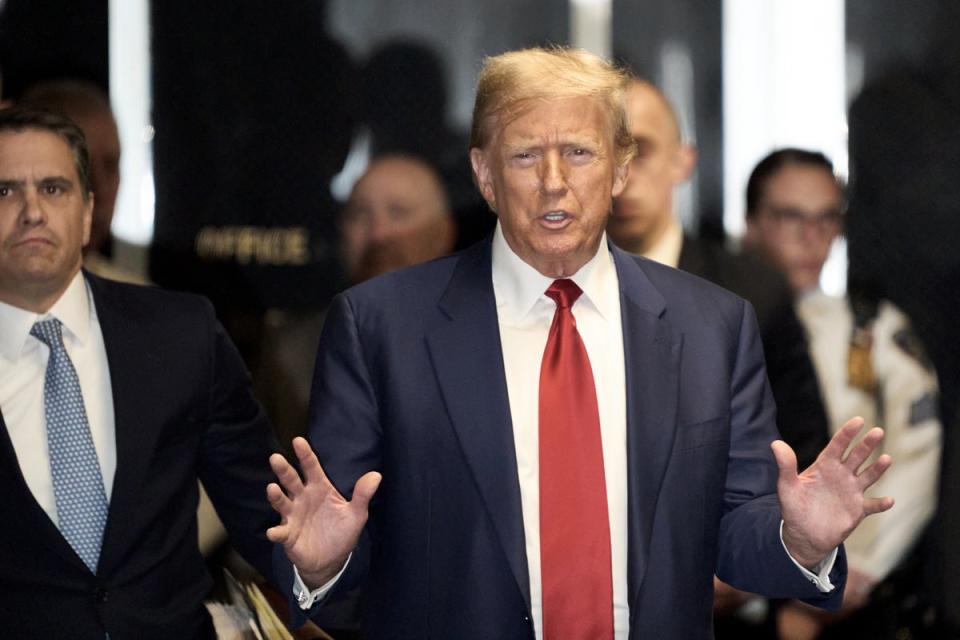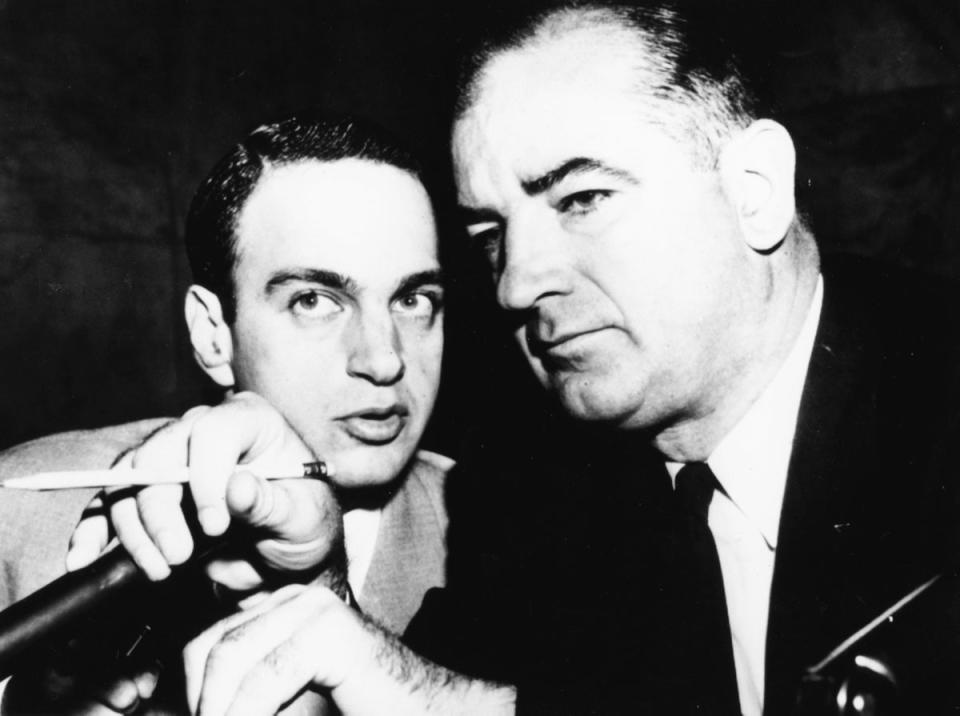Why can’t Donald Trump stop verbally attacking judges, prosecutors – and anybody who crosses him?

Donald Trump, whose hush money trial began on Monday with discussion of whether he should be held in contempt for his social media posts, has over the course of the last year spent more and more of his time attacking judges, prosecutors, and anyone involved in the legal cases against him.
The hush money trial, which comes after the former president was charged with 34 counts of business fraud last year, will begin with jury selection, a process which could take days or weeks and go through hundreds of prospective jurors.
The charges relate to the hush money paid to adult actor Stormy Daniels shortly before the 2016 election, which was logged as legal expenses.
On Thursday, Mr Trump referred to Attorney General Merrick and Special Counsel Jack Smith as being part of President Joe Biden’s “crew of Hacks and Thugs,” calling Mr Smith “deranged”. He also slammed the judges overseeing his criminal and civil cases in New York as “dishonest, politically biased, and conflicted”.
On Monday morning, just hours before the trial was set to begin, he called the case a “witch hunt” as he argued for the trial to “be ended by the highly conflicted presiding Judge”.
It’s become an increasingly common refrain from Mr Trump, who appears unable to stop his attacks even when they put him in increased legal, personal, and financial jeopardy.
A litany of pundits have argued that if Mr Trump could just stop talking about himself and start talking about the issues voters care about, he’d be much likelier to win re-election this fall.
So why can’t he stop his verbal attacks?
“He’s unable to tolerate evidence of his own fallibility, and [he’s] not willing to take accountability publicly, he seems to have to insist on being right all the time,” Dr Leonard Glass, an associate clinical professor of psychiatry at Harvard Medical School, tells The Independent.
Tom Fitton, the president of the conservative organisation Judicial Watch, says Mr Trump is right to criticise the legal system, including judges, arguing that many of his complaints are “well-founded”.
“It’s his absolute right as a citizen to raise these issues, and certainly as a criminal defendant and presidential candidate there are even heightened First Amendment protections for what he has said,” he tells The Independent. “Unfortunately, we have too many judges acting politically as opposed to following and applying the law in an unbiased manner.
“To criticize a judge is not to threaten him,” he argues.
Social psychologist Arie Kruglanski at the University of Maryland says Mr Trump is doing what his supporters expect him to do.
“He’s always arguing that the establishment, the Democrats, and others are carrying out a witch hunt against him. And by ambiguating the situation by creating a legal muddle, he [pushes] that kind of argument that really, things are not clear, that ... the lawsuits against him are all based on a political witch hunt,” he tells The Independent.
He notes that if Mr Trump didn’t push back, “people might get the impression that he’s really in the wrong, but he’s contesting that”.
“People expect him to be a fighter ... He’s demonstrating his resilience,” he adds.
Dr John Hibbing at the University of Nebraska-Lincoln tells The Independent, “I just think Trump believes that anything that stands in his way needs to be taken down, and his supporters tend to agree with that. Whether it be the Electoral College or the courts or state governments, or whatever it is, they need to get out of the way”.
"For them, America is under threat. And it’s an existential issue. So you’ve got the core ... ethos of America – white, Christian, straight – under attack, and for them, the country is at stake here. And anything they need to do, whether it be taking down the courts or something else ... the ends justify the means,” he adds.
Mr Trump’s refusal to accept any kind of responsibility “spills naturally from his lips,” Dr Glass says. “That perspective makes it seem as though he is in fact entitled to plead his victimhood and to see the people who tried to hold him to account as bad people bent on depriving not only him but his followers, of their rights.”
“He ascribes all kinds of terrible motives and characteristics to them, many of which are simply images of himself that he rejects and puts on other people,” he adds.
“He’s a child,” former Republican strategist Rick Wilson tells The Independent. “He has no impulse control at all. He has no ability to constrain or conform his behaviour.”
“While his people think that’s charming, it’s really kind of sad to watch a grown man who is the nominee of his political party, being unable to, in any way, contain himself, even when it can cause him enormous legal and financial and personal jeopardy,” he adds.
Dr Glass says: “He’s extraordinarily immature for a grown man. He just can’t seem to contain his impulses.”
He argues that Mr Trump has revealed his lack of impulse control in his marriages, adding that he has treated contractors who have worked for him in the past as if they have “no rights”.
Mr Trump is famously alleged to have had a number of affairs, including with adult actor Stormy Daniels in 2006 just a year after marrying Melania Trump, an affair Mr Trump denies but which led to the ongoing hush money case. That marriage was Mr Trump’s third, following his unions with Ivana Trump and Marla Maples.
In June 2016, just months before he was elected president, USA Today reported that hundreds of people, including carpenters, dishwashers, painters, as well as his own attorneys, alleged that Mr Trump avoided paying them for their work.
“Let’s say that they do a job that’s not good, or a job that they didn’t finish, or a job that was way late. I’ll deduct from their contract, absolutely,” Mr Trump told USA Today at the time. “That’s what the country should be doing.”
‘Trump has a deep contempt for any kind of rules’

“It all comes from a position of being like a spoiled child,” Dr Glass says. “In his late 70s, he does the same sorts of behaviours that you would see in a child on a playground, who was a bully, and never recognize that when you play a game, sometimes you win, and sometimes you lose.”
“Trump has a deep contempt for any kind of rules, restrictions, laws, norms, traditions, that could constrain him in any way,” Mr Wilson argues. “And that’s just a fundamental fact of being Donald Trump, he does not believe those things apply to him. And he does not believe that those things matter in any way.”
“The second part of it is he has been successful over the years and intimidating people in business … that has been a hallmark – his ability to scare people out of collecting money that he owes them,” he adds.
Dr Hibbing, of the University of Nebraska-Lincoln, argues that people are predisposed to feel one of two ways: “Some people want to embrace outsiders and they welcome immigrants and new ideas and new faces and new things and other people react very strongly against that – they want to preserve this ethos, whether it be Brexit in the UK or Donald Trump in the United States”.
“They see this as a way of really keeping their country what it should be, which is what it’s always been, whether that be ethnicity or race or religion, language."
He adds that “you’ve got a significant minority in almost all countries around the world that has a kind of nativist tendency that really wants to preserve what they see as the inner essence of the country, and they see it under threat from the increased mobility of people around the world, and the woke movement and all these things they see as challenges to this core”.
“And they feel this strongly in a way that I think those of us who are not in that community have difficulty understanding,” Dr Hibbing says.
‘To criticize a judge is not to threaten him’

The New York judge in charge of the hush money case against Mr Trump, New York State Supreme Court Justice Juan Merchan, expanded a gag order against the former president to include the judge’s family and the family of District Attorney Alvin Bragg after Mr Trump attacked Judge Merchan’s daughter, calling her a “rabid Trump hater” and argued that the judge was compromised because of his daughter’s work for a digital marketing firm aligned with the Democrats.
Mr Trump has been charged with dozens of counts of business fraud in the case, having allegedly falsely filed hush money payments as legal expenses.
“It is no longer just a mere possibility or a reasonable likelihood that there exists a threat to the integrity of the judicial proceedings,” Judge Merchan wrote. “The threat is very real. Admonitions are not enough, nor is reliance on self-restraint.”
“I don’t know what the judge is talking about,” Mr Fitton says of Judge Merchan. “It seems to me he’s abusing his authority to protect himself and his daughter from criticism about their conduct, and about a matter of public importance, whether the judge has been compromised and needs to recuse himself because of his daughter’s business relationships with the politicians who are benefiting from the judge’s rulings.”
Mr Trump has also gone after the judge in the civil case brought against him by New York state for inflating the value of his assets to get better deals on loans and insurance. He called New York State Supreme Court Justice Arthur Engoron “corrupt” and argued that his credibility had been “shattered”.
The former president has slammed the gag order as unconstitutional. The original gag order banned Mr Trump from going after court staff, possible jurors, and witnesses.
“The judge might feel protective of his clerk,” Dr Glass says. So Mr Trump attacks “the clerk to show that the judge is vulnerable to being demeaned. He earns himself gag orders because his behaviour is tolerated in the schoolyard to a limited extent” but a court under the guidance of a judge “is quite a different situation, and he doesn’t seem to be able to control his impulses sufficiently to accommodate the different social setting”.
Dr Bandy Lee, a forensic psychiatrist and editor of The Dangerous Case of Donald Trump: 27 Psychiatrists and Mental Health Experts Assess a President, published in October 2017, told The Independent that “The same dangerous case of Donald Trump has not changed. What has changed is his years of experience of being enabled, encouraged, and empowered in his dangerous behaviour and our society is suffering the effects of not having intervened properly in the earlier stages. This has led to him having become a threat to American democracy”.
Mr Wilson says Mr Trump’s repeated attacks on judges, prosecutors, and their family members are less part of an overarching campaign strategy, and more the actions of a vengeful man, unable to restrain himself.
“He wants to frame it to his supporters in a way that says, ‘This is a system against me, and they’re trying to make me obey the rules that are set up to hurt me. The deep state is out to get me’ – all these lies that he tells his supporters are very convenient,” the strategist says.
But Mr Wilson also argues that Mr Trump “needs the overall campaign to be about his legal problems so he can claim that that it’s all a conspiracy against him”.
The Independent has reached out to the Trump campaign for comment.
Dr Kruglanski says Mr Trump “basically owns the Republican Party. And the Republicans want to win, and therefore, whatever his tactics are that seem to be bringing the votes are appealing to them”.
“He’s demonstrating that his appeal has not waned even though he has been the subject of all these lawsuits ... He’s like Teflon – nothing sticks to him,” he adds.
Dr Kruglanski, of the University of Maryland, notes that some may find Mr Trump’s attacks to be “morally repugnant” and that it might “diminish some of his lustre”.
“But I think that the likelihood of that is less than the likelihood of this being of great appeal to Republicans who want to be combative, who want to win elections,” he says.
Learning lessons
Mr Wilson and Dr Kruglanski say Mr Trump learned a lot from Roy Cohn, a lawyer and prosecutor who served as the chief counsel to Senator Joseph McCarthy during his hunt for communists in the US government and the upper echelons of American culture. He later became a political fixer in New York in the 1970s and 1980s when he mentored Mr Trump. He also represented mafia boss Carmine Galante.

Mr Trump has unleashed a litany of attacks following the Cohn playbook, calling Special Counsel Jack Smith “evil and sick”, and attacking Fulton County, Georgia District Attorney Fani Willis and New York Attorney General Letitia James.
“Whenever you go into a maximum security prison, you never see perpetrators,” Dr Lee says. “They’re all victims … In their view, they are always going to be defending themselves against outside imaginary or exaggerated attacks. [Mr Trump] will continue to attack and … [create] reasons for further assault, not knowing that he is the origin of all his perceived persecution.”
“The only way to contain him is to set limits so that his expectations become more realistic,” she adds.
Dr Kruglanski says Mr Cohn’s “philosophy was that you’ve got to come out counterpunching – Life is one big fight. And lawsuits are the way things are being fought. And so, [Mr Trump] is ready for combat”.
‘Incapable of acknowledging that he’s less than perfect’
The “mean and vengeful” Mr Trump is “incapable of acknowledging that he’s less than perfect, which of course, none of us are,” Dr Glass says. “He so vigorously postures and repudiates any flaw and acts as though he really was pure in the way that we would ascribe to a godlike figure which I think most people would recognize he falls short [of].”
Dr Lee, the forensic psychiatrist and editor of The Dangerous Case of Donald Trump, says that Mr Trump’s reaction to losing an election or facing a large number of charges is to form “a reaction against the truth because the truth is just so intolerable to him that he cannot accept it”.
Mr Trump’s followers are “absolutely tied to his person because he has conditioned them this way, by preying on their emotional needs. He needs the adulation of these crowds, in order to buttress his sense of self and to deny his feelings of inadequacy and worthlessness, which is a constant struggle in someone who has catastrophically low internal sources of self-love,” she adds.
“I think you should compare and contrast, President Trump’s criticism of the judges who are, in my view, improperly abusing him versus the left-wing criticism of [US District Court Judge Aileen] Cannon or [Supreme Court Justice Clarence] Thomas or Justice [Samuel] Alito,” Mr Fitton, the president of Judicial Watch, says. “Supreme Court justices have [had] individuals outside their homes protesting in violation of federal law … And [Mr Trump] complains about judges applying and abusing the law in ways never seen before in American history. And he’s not allowed to say anything.”
If Mr Trump loses in the fall, it’s “because Americans made a choice between America and Trump,” Mr Wilson, the former Republican strategist, says.
“We’re deeply divided over the future of whether we have an American Republic that functions on constitutional grounds or whether we go to a sort of Trumpian autocracy. And there are plenty of Americans who would like that,” he adds.
“If America decides that Donald Trump needs another four years in office, it’s a country that’s going to be very different than anything we’ve seen in a long time,” he says.
Mr Fitton, president of Judicial Watch, argues that the court processes against the former president amount to “election rigging attempts”.
“If the election goes south for Trump … one would have to look at … the attempt to distract him from campaigning and divert his resources,” he adds.
Dr Kruglanski says Mr Trump is “a very aggressive, combative individual. And that’s the secret of his personality, the secret of his appeal. And it has worked for him – he was incredibly the President of the United States. And there’s better than chance likelihood that he’s going to be that again”.
